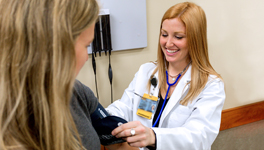
2/1/2021
Lorrie Burns
Lorrie’s Story
Lorrie Burns, Pharm.D., CPPS, received her Bachelor of Science in Pharmacy degree in 1980 from Ohio Northern University and completed her Doctor of Pharmacy degree from Ohio State University in 2003. She served as Clinical Pharmacist for the award-winning Riverside Neuroscience Team for 22 years and assisted in its attainment of Ohio’s first Joint Commission Accredited Primary Stroke Center in 2004. She transitioned to Medication Safety in 2011 and successfully achieved board certification as a Certified Professional in Patient Safety in 2015 and completed the ISMP/ASHP Medication Safety Certificate program in 2019.
Overview of Facility/Health System
Riverside Methodist Hospital is the flagship hospital for OhioHealth, a health system in Ohio with 12 hospitals and more than 200 ambulatory sites, hospice, home health and other health services covering a 47-county area. Riverside is a private, non-profit tertiary care teaching hospital with 1,059 licensed beds and 122 intensive care beds with hospital admissions of 46,000 in 2019 as well as 84,313 emergency room visits. Riverside has a strong presence in neuroscience and stroke care and advanced from Primary Stroke Center to become the first certified Joint Commission Comprehensive Stroke Center in Ohio.
Significant Projects
Dr. Burns works in consultation with frontline staff, pharmacy management and the informatics team to improve the safety of the pharmacy computer platform. Some examples include refining the labels for I.V. products to provide improved clarity regarding the contents and instructions for making the admixture, and revising an extensive medication taper to improve its function. Drug shortages are a serious threat to patient safety, and when a national shortage of magnesium 20gm/500ml premade bags occurred, Dr. Burns worked with Labor and Delivery staff, pharmacy operations and procurement and developed an 11-step strategy to assure that larger liter bags of magnesium would not be confused with liter bags of oxytocin. With the early challenges of the COVID-19 pandemic, Dr. Burns was added to a pharmacy clinical leadership team to assist with data mining and decision making regarding emerging strategies for the various aspects of the care of patients with the novel coronavirus infection. She was also tapped to bring a medication safety mindset to a system pharmacy committee tasked with the setup and implementation of a 500-bed alternative site of care hospital at the Columbus Convention Center if COVID admissions swamped the local hospital systems.
Initial Involvement in ASHP
Dr. Burns is serving ASHP’s Section of Inpatient Care Practitioners as a member of the Section Advisory Group on Medication Safety.
Why did you become involved in ASHP?
Dr. Burns is a longtime member of ASHP with initial interest to see the direction at the national level that our profession was moving. She became more involved initially on the state affiliate level, serving on OSHP’s Professional Affairs Division for many years and eventually leading it. This led to the honor of serving as OSHP’s president in 2015-16 and networking opportunities with other affiliate presidents – again viewing and participating in the larger picture of our profession’s advancement and direction. Serving as a member of ASHP’s Commission on Affiliate Relations also strengthened her interest in participating in the progress being made at the affiliate and national level.
How would you explain the value of ASHP to a friend or colleague?
Dr. Burns worked to advance PPMI during her leadership roles in OSHP – and was struck by the recommendation that “all patients should have a right to the care of a pharmacist”. This should resonate in our core – that by advancing our profession we improve the health of those we serve. ASHP provides the advocacy, tools and resources to assist pharmacists in creating a healthier community.
What kind of advice would you provide for someone new to your specialty area?
Networking is so important in the various roles that pharmacists may have during their careers, and especially so in Medication Safety. New strategies to reduce risk or harm to patients are widely shared which allows medication safety pharmacists to lateralize these actions at their sites. Getting up to speed can be accomplished via learning opportunities such as the Institute for Safe Medication Practices (ISMP) Medication Safety Intensive or participation in the ASHP/ISMP Medication Safety Certificate. Lastly, a tenured medication safety pharmacist as a mentor can act as a sounding board and assist in improving your practice. Don’t be afraid to reach out!
What is the value of ASHP for the profession?
Regarding advocacy, Dr. Burns feels – “it never hurts to ask” and has been involved in advocacy on the state and national level to advance pharmacy practice. ASHP serves its constituency by assisting with advocacy – for our need to act to support pharmacy practice advancement is both critical and constant. Although we may hope that progressive legislation on the state and federal level allowing for enhanced pharmacy practice modes will simply, “occur,” the reality is that we, along with ASHP, must be a strong and unwavering force to help the aforementioned legislation be created and approved.

Inpatient Care Practitioner


